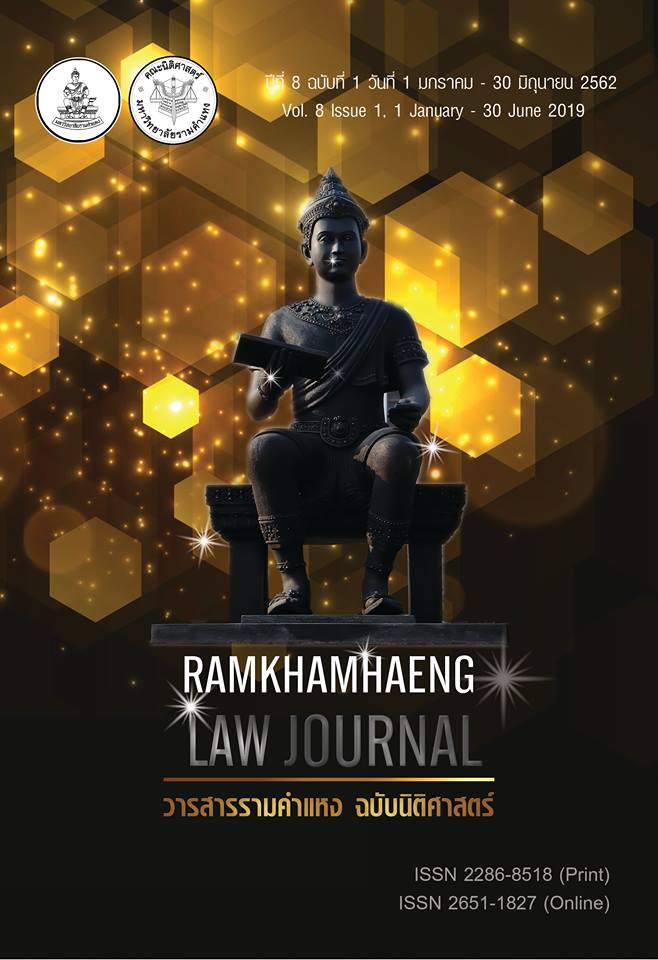“ใช้บังคับเมื่อพ้นกำหนดหนึ่งร้อยยี่สิบวันนับแต่วันประกาศในราชกิจจานุเบกษาเป็นต้นไป”นับอย่างไร?
Main Article Content
บทคัดย่อ
คณะกรรมการกฤษฎีกา (คณะที่ 10) ได้ให้ความเห็นในปัญหาเกี่ยวกับวันเริ่มมีผลใช้บังคับของพระราชบัญญัติป้องกันและปราบปรามการฟอกเงิน พ.ศ.2542 ซึ่งประกาศในราชกิจจานุเบกษา เมื่อวันที่ 21 เมษายน 2542 โดยมาตรา 2 แห่งพระราชบัญญัติดังกล่าวบัญญัติว่า “พระราชบัญญัตินี้ ให้ใช้บังคับเมื่อพ้นกำหนดหนึ่งร้อยยี่สิบวันนับแต่วันประกาศในราชกิจจานุเบกษาเป็นต้นไป” ไว้ว่า กำหนดเวลาเริ่มใช้บังคับกฎหมายนั้นจะต้องเป็นไปตามบทบัญญัติที่กำหนดไว้ในกฎหมายนั้นเอง เพราะมิใช่เป็นเรื่องการคำนวณนับระยะเวลาตามบทบัญญัติว่าด้วยระยะเวลาในลักษณะ 5 บรรพ 1 แห่งประมวลกฎหมายแพ่งและพาณิชย์ เมื่อมาตรา 2 แห่งพระราชบัญญัติป้องกันและปราบปรามการฟอกเงินฯ บัญญัติไว้ชัดเจนแล้วว่า พระราชบัญญัตินี้ให้ใช้บังคับเมื่อพ้นกำหนดหนึ่งร้อยยี่สิบวันนับแต่วันประกาศในราชกิจจานุเบกษาเป็นต้นไป ดังนั้น กำหนดระยะเวลาหนึ่งร้อยยี่สิบวันจึงต้องเริ่มนับตั้งแต่วันที่ 21 เมษายน 2542 ซึ่งพระราชบัญญัติลงประกาศในราชกิจจานุเบกษาเป็นวันแรก
ความเห็นของคณะกรรมการกฤษฎีกา (คณะที่ 10) ดังกล่าว แตกต่างจากความเห็นทางตำราและคำพิพากษาศาลฎีกาที่ 5470/2538 ที่ 5809/2539 และที่ 2086/2553 ซึ่งเป็นคำพิพากษา ศาลฎีกาที่วินิจฉัยในเรื่องวันที่กฎหมายเริ่มมีผลใช้บังคับไว้โดยตรง ทำให้เกิดข้อสงสัยว่า กำหนดเวลาเริ่มใช้บังคับของกฎหมายที่มีระยะของเวลาหรือช่วงความยาวของเวลาเข้ามาเกี่ยวข้องดังเช่นที่มาตรา 2 ของพระราชบัญญัติป้องกันและปราบปรามการฟอกเงินฯ บัญญัติไว้นี้จะไม่ใช่เรื่องการนับระยะเวลาตามประมวลกฎหมายแพ่งและพาณิชย์ มาตรา 193/1 ได้อย่างไร อีกทั้งถ้อยคำตาม มาตรา 2 ดังกล่าวก็ไม่ได้แสดงให้เห็นอย่างชัดแจ้งว่าได้กำหนดวิธีการนับระยะเวลาไว้เป็นพิเศษอย่างอื่น อันจะเข้าข้อยกเว้นตามประมวลกฎหมายแพ่งและพาณิชย์ มาตรา 193/1 ตอนท้าย ยิ่งไปกว่านั้น ในข้อสังเกตของสำนักงานคณะกรรมการกฤษฎีกาซึ่งกล่าวว่า ในเรื่องนี้มีคำพิพากษาศาลฎีกาที่เกี่ยวข้อง 2 คำพิพากษาและขัดแย้งกันเอง คือ คำพิพากษาศาลฎีกาที่ 5809/2539 กับคำพิพากษาศาลฎีกาที่ 70/2477 และความเห็นของคณะกรรมการกฤษฎีกา (คณะที่ 10) ดังกล่าวตรงกับคำพิพากษาศาลฎีกาที่ 70/2477 นั้น คำพิพากษาศาลฎีกาที่ 5809/2539 และที่ 70/2477 ไม่มีประเด็นเรื่องวันที่กฎหมายเริ่มมีผลใช้บังคับในชั้นฎีกา และยิ่งไปกว่านั้นถ้อยคำตามกฎกระทรวงมหาดไทย ที่อ้างถึงในคำพิพากษาศาลฎีกาที่ 70/2477 ก็ไม่ตรงกับถ้อยคำตามมาตรา 2 ของพระราชบัญญัติป้องกันและปราบปรามการฟอกเงินฯ ด้วย ในทางปฏิบัติ บางครั้งมีผู้ใช้กฎหมายเข้าใจคลาดเคลื่อนโดยนำความเห็นของคณะกรรมการกฤษฎีกา (คณะที่ 10) ไปใช้กับการนับระยะเวลาอื่นๆ ที่มิใช่เรื่องการมีผลใช้บังคับของกฎหมาย และบางครั้งผู้ร่างกฎหมายก็พยายามใช้ถ้อยคำเพื่อหลีกเลี่ยงผลตามการตีความความเห็นของคณะกรรมการกฤษฎีกา (คณะที่ 10) นี้ ซึ่งทำให้การตีความกฎหมายกลายเป็นมีความยุ่งยากมากขึ้น การยึดถือแนวทางในการตีความตามคำพิพากษาศาลฎีกาที่เป็นบรรทัดฐานทำให้การบังคับใช้กฎหมายมีความแน่นอน โดยเฉพาะอย่างยิ่งหากแนวบรรทัดฐานคำพิพากษาศาลฎีกานั้นสอดคล้องกับบทบัญญัติและเจตนารมณ์ของกฎหมายอยู่แล้ว ความเห็นของคณะกรรมการกฤษฎีกา (คณะที่ 10) ในเรื่องนี้จึงน่าจะได้รับการพิจารณาอีกครั้ง

